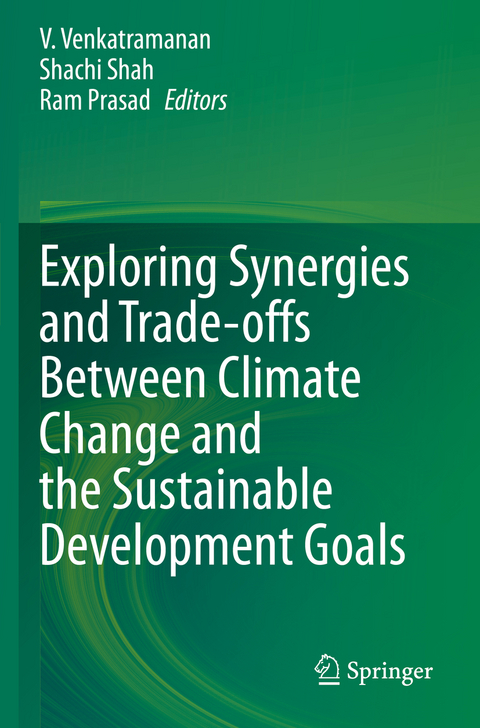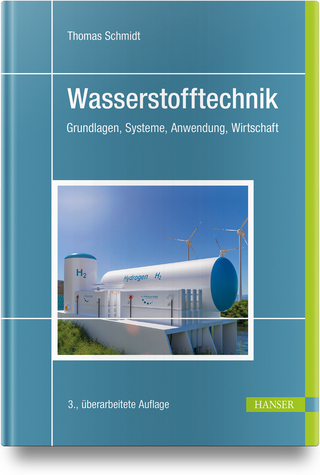
Exploring Synergies and Trade-offs between Climate Change and the Sustainable Development Goals
Springer Verlag, Singapore
978-981-15-7303-3 (ISBN)
This book explores the synergies and trade-offs between climate change management and other SDGs. It highlights the policy imperatives as well as the interrelations between combating climate change and its impacts (SDG 13) and food and nutritional security (SDG 2), water security (SDG 6), soil security (SDG 15), energy security (SDG 7), poverty eradication (SDG 1), gender equality (SDG 5), resilient infrastructure (SDG 9), and sustainable and resilient cities (SDG 11).
V. Venkatramanan, Ph.D. is an Assistant Professor at the School of Interdisciplinary and Transdisciplinary Studies, Indira Gandhi National Open University, New Delhi. His interests include climate smart agriculture, climate policy, biodegradation and green technologies for environmental management. He has published more than 20 research papers in peer- reviewed journals and book chapters. Shachi Shah, Ph.D. is an environmentalist with nearly two decades of teaching and research experience at various respected universities and institutes. She is an Associate Professor (Environmental Studies) at the School of Interdisciplinary and Transdisciplinary Studies, IGNOU, New Delhi. Her research interests include green technologies for waste management and energy generation, bioremediation, waste valorization, plant growth promoting organisms, and biodiversity conservation. Moreover, she has authored more than 50 publications. Ram Prasad, Ph.D.is associated with the Department of Botany, Mahatma Gandhi Central University, Motihari, Bihar, India. His research interests include applied & environmental microbiology, plant-microbe-interactions, sustainable agriculture and nanobiotechnology. He has published more than 150 research papers, review articles & book chapters, has five patents issued or pending, and edited or authored several books. Dr. Prasad has twelve years of teaching experience and has been awarded the Young Scientist Award & Prof. J.S. Datta Munshi Gold Medal by the International Society for Ecological Communications; FSAB fellowship by the Society for Applied Biotechnology; the American Cancer Society UICC International Fellowship for Beginning Investigators, USA; Outstanding Scientist Award in the field of microbiology by Venus International Foundation; and the BRICPL Science Investigator Award and Research Excellence Award. He is an editorial board member for Frontiers in Microbiology, Frontiers in Nutrition,Archives of Phytopathology and Plant Protection, Phyton-International Journal of Experimental Botany, Academia Journal of Biotechnology, and the Journal of Renewable Materials, and series editor of Nanotechnology in the Life Sciences, Springer Nature, USA. Previously, Dr. Prasad served as an Assistant Professor at Amity University Uttar Pradesh, India; Visiting Assistant Professor, Whiting School of Engineering, Department of Mechanical Engineering at Johns Hopkins University, Baltimore, United States and Research Associate Professor at the School of Environmental Science and Engineering, Sun Yat-sen University, Guangzhou, China.
Chapter 1. Achieving Food and Nutrition Security and Climate Change: Clash of the Titans or Alignment of the Stars?.- Chapter 2. Climate Change, Hunger and Food Security in Asia with special reference to Sri Lanka: Can the SDGs be Achieved by 2030?.- Chapter 3. The Status of Climate Variability and Food Accessibility: A Case of Households in Gauteng Province, South Africa.- Chapter 4. Climate resilient mariculture technologies for food and nutritional security.- Chapter 5. Climate change and adaptation: Recommendations for agriculture sector.- Chapter 6. Integrated Farming Systems: Climate Resilient Sustainable Food Production System in the Indian Himalayan Region.- Chapter 7. Adaptation mechanism of methylotrophic bacteria to drought condition and its strategies in mitigating plant stress caused by climate change.- Chapter 8. Synergies and Trade-offs between Climate Change and the Sustainable Development Goals in the Context of Marine Fisheries.- Chapter 9. Increasing Synergies between Climate Change and Sustainable Development in Energy Policy.- Chapter 10. Ensuring Domestic Water Security for Cities under Rapid Urbanisation and Climate Change Risks.- Chapter 11. Improving Water Productivity for Smallholder Rice Farmers in the Upper West Region of Ghana: A Review of Sustainable Approaches.- Chapter 12. Synergies between climate change, biodiversity, ecosystem function and services, indirect drivers of change and human well-being in forests.- Chapter 13. Climate change projections of current and future distributions of the endemic Loris lydekkerianus (Lorinae) in peninsular India.- Chapter 14. Climate Change, Air Pollution and SDG 3: An Indian Perspective.- Chapter 15. Empowerment of fisherwomen through marine farming.
| Erscheinungsdatum | 29.11.2021 |
|---|---|
| Zusatzinfo | 115 Illustrations, black and white; XIV, 402 p. 115 illus. |
| Verlagsort | Singapore |
| Sprache | englisch |
| Maße | 155 x 235 mm |
| Themenwelt | Naturwissenschaften ► Biologie ► Ökologie / Naturschutz |
| Weitere Fachgebiete ► Land- / Forstwirtschaft / Fischerei | |
| Schlagworte | climate change • Climate resilience • Climate Smart Agriculture • Gender equality • global climate change • Global Food Policy • smart cities |
| ISBN-10 | 981-15-7303-4 / 9811573034 |
| ISBN-13 | 978-981-15-7303-3 / 9789811573033 |
| Zustand | Neuware |
| Haben Sie eine Frage zum Produkt? |
aus dem Bereich


